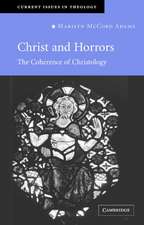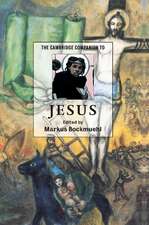Economic Compulsion and Christian Ethics: New Studies in Christian Ethics, cartea 24
Autor Albino Barreraen Limba Engleză Paperback – 9 sep 2007
| Toate formatele și edițiile | Preț | Express |
|---|---|---|
| Paperback (1) | 323.00 lei 6-8 săpt. | |
| Cambridge University Press – 9 sep 2007 | 323.00 lei 6-8 săpt. | |
| Hardback (1) | 698.30 lei 6-8 săpt. | |
| Cambridge University Press – 7 sep 2005 | 698.30 lei 6-8 săpt. |
Din seria New Studies in Christian Ethics
-
 Preț: 206.94 lei
Preț: 206.94 lei -
 Preț: 283.79 lei
Preț: 283.79 lei -
 Preț: 203.67 lei
Preț: 203.67 lei -
 Preț: 282.26 lei
Preț: 282.26 lei - 11%
 Preț: 638.22 lei
Preț: 638.22 lei -
 Preț: 200.99 lei
Preț: 200.99 lei - 11%
 Preț: 643.70 lei
Preț: 643.70 lei -
 Preț: 287.28 lei
Preț: 287.28 lei - 9%
 Preț: 593.84 lei
Preț: 593.84 lei - 9%
 Preț: 593.66 lei
Preț: 593.66 lei -
 Preț: 312.36 lei
Preț: 312.36 lei -
 Preț: 434.79 lei
Preț: 434.79 lei -
 Preț: 379.12 lei
Preț: 379.12 lei -
 Preț: 280.74 lei
Preț: 280.74 lei -
 Preț: 369.32 lei
Preț: 369.32 lei -
 Preț: 324.53 lei
Preț: 324.53 lei -
 Preț: 314.23 lei
Preț: 314.23 lei -
 Preț: 254.06 lei
Preț: 254.06 lei -
 Preț: 279.65 lei
Preț: 279.65 lei -
 Preț: 284.17 lei
Preț: 284.17 lei -
 Preț: 283.03 lei
Preț: 283.03 lei -
 Preț: 373.74 lei
Preț: 373.74 lei -
 Preț: 252.30 lei
Preț: 252.30 lei -
 Preț: 254.06 lei
Preț: 254.06 lei -
 Preț: 335.16 lei
Preț: 335.16 lei -
 Preț: 295.58 lei
Preț: 295.58 lei -
 Preț: 402.09 lei
Preț: 402.09 lei - 11%
 Preț: 693.51 lei
Preț: 693.51 lei
Preț: 323.00 lei
Nou
Puncte Express: 485
Preț estimativ în valută:
61.80€ • 64.71$ • 51.26£
61.80€ • 64.71$ • 51.26£
Carte tipărită la comandă
Livrare economică 10-24 aprilie
Preluare comenzi: 021 569.72.76
Specificații
ISBN-13: 9780521043571
ISBN-10: 0521043573
Pagini: 268
Ilustrații: 1 b/w illus.
Dimensiuni: 153 x 229 x 17 mm
Greutate: 0.4 kg
Ediția:New.
Editura: Cambridge University Press
Colecția Cambridge University Press
Seria New Studies in Christian Ethics
Locul publicării:Cambridge, United Kingdom
ISBN-10: 0521043573
Pagini: 268
Ilustrații: 1 b/w illus.
Dimensiuni: 153 x 229 x 17 mm
Greutate: 0.4 kg
Ediția:New.
Editura: Cambridge University Press
Colecția Cambridge University Press
Seria New Studies in Christian Ethics
Locul publicării:Cambridge, United Kingdom
Cuprins
General editor's preface; Preface; Part I. The Nature and Dynamics of Economic Compulsion: 1. Markets and coercive pecuniary externalities; 2. The regressive incidence of unintended burdens; Part II. Setting the Moral Baseline and Shaping Expectations: 3. Economic security as God's twofold gift; 4. Retrieving the biblical principle of restoration; Part III. Contemporary Appropriation: 5. Economic rights-obligations as diagnostic framework; 6. Application: the case of agricultural protectionism; 7. Summary and conclusions; References; Index.
Recenzii
'… this is an important book on a very timely subject … it is the engagement with the world outside religion which gives the book real credibility.' Church Times
'… an impressive addition to this series … This book sets a high standard for those working on the interface of theology and economics.' Journal of Theological Studies
'This is a very detailed and technically demanding analysis of the arguments surrounding the concept 'economic compulsion'. … a tightly argued piece of work that depends on knowledge of moral philosophy, economics, scripture and contemporary discussion of human rights. Work of this intellectual rigour makes much writing on social ethics look … amateurish … This book makes a powerful case for the duty of Christians to respond to the continuing imperative of being the agents of divine providence in economic insecurity. It also is a good example of how moral theology can be informed by a cosmology that allows human beings freedom of action as the means by which their moral formation is secured.' Ecclesiology
'This volume is an extremely important one - one of the very best on Christian economic ethics.' Journal of Markets & Morality
'… this book … is well worth the effort, deeply instructive as it is about matters with which we should all be concerned …' Heythrop Journal
'… an impressive addition to this series … This book sets a high standard for those working on the interface of theology and economics.' Journal of Theological Studies
'This is a very detailed and technically demanding analysis of the arguments surrounding the concept 'economic compulsion'. … a tightly argued piece of work that depends on knowledge of moral philosophy, economics, scripture and contemporary discussion of human rights. Work of this intellectual rigour makes much writing on social ethics look … amateurish … This book makes a powerful case for the duty of Christians to respond to the continuing imperative of being the agents of divine providence in economic insecurity. It also is a good example of how moral theology can be informed by a cosmology that allows human beings freedom of action as the means by which their moral formation is secured.' Ecclesiology
'This volume is an extremely important one - one of the very best on Christian economic ethics.' Journal of Markets & Morality
'… this book … is well worth the effort, deeply instructive as it is about matters with which we should all be concerned …' Heythrop Journal
Notă biografică
Descriere
Barrera addresses adverse effects of market operations on individuals from the viewpoint of Christian ethics.













